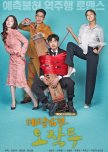For the first half of this drama at least, it tells a good story about the struggles of a successful career woman who defies society by refusing to marry but ends up pursuing a contract relationship anyway.
Han Seung-joo, played by Uee, is not just single - she's alone. Her family are judgemental, abusive parasites and her friends have their own lives. She inherits a mountain from her Aunt that her family is intent on developing into a resort. But when she feels threatened in her own home, she decides to hire a man to be her husband. Oh Jak-doo (Kim Kang-woo) is seemingly a lowly herb-gatherer from the mountain she now owns and he accepts the role in exchange for her leaving his mountain home undeveloped.
At the beginning, this drama had an intelligent script that seemed to be at war with the Makjang direction. It doesn't matter how strong or independent you are, it was saying, you still need somebody to be on your side. In essence, everybody needs a mountain. Seung-joo's mountain was both figurative and literal: when things got too difficult for her, she now had somewhere solid and unchanging to rest.
From the start, the Makjang direction was extremely jarring. Full of intense close-ups, overwrought - almost screeching - line deliveries, and long scenes devoted to the bumbling slapstick antics of three mountain Halmeonis, the direction was a sour note in a otherwise enjoyable show.
Unfortunately, by about episode 14 it became obvious the director knew something we didn't. The show veered sharply into Makjang and never recovered. At a daunting 24 episodes, this meant almost half the drama was full of contrived conflict, opaque character motivations and general audience confusion. And screeching. There's a lot of screeching.
While Kim Kang-woo's Oh Jak-doo is often swoonworthy, the show is stolen repeatedly by the affectatious and pretentious Eric Cho as a second male lead, played with a lot of heart and self-awareness by Jung Sang-hoon. Uee also gives her character a lot of strength and vulnerability but both she and Kim Kong-woo struggle with their characters once their motivations get murky.
The performances are not enough to save what is, in the end, a poorly-written and badly-paced soap opera that has little overall point to make about anything.
Han Seung-joo, played by Uee, is not just single - she's alone. Her family are judgemental, abusive parasites and her friends have their own lives. She inherits a mountain from her Aunt that her family is intent on developing into a resort. But when she feels threatened in her own home, she decides to hire a man to be her husband. Oh Jak-doo (Kim Kang-woo) is seemingly a lowly herb-gatherer from the mountain she now owns and he accepts the role in exchange for her leaving his mountain home undeveloped.
At the beginning, this drama had an intelligent script that seemed to be at war with the Makjang direction. It doesn't matter how strong or independent you are, it was saying, you still need somebody to be on your side. In essence, everybody needs a mountain. Seung-joo's mountain was both figurative and literal: when things got too difficult for her, she now had somewhere solid and unchanging to rest.
From the start, the Makjang direction was extremely jarring. Full of intense close-ups, overwrought - almost screeching - line deliveries, and long scenes devoted to the bumbling slapstick antics of three mountain Halmeonis, the direction was a sour note in a otherwise enjoyable show.
Unfortunately, by about episode 14 it became obvious the director knew something we didn't. The show veered sharply into Makjang and never recovered. At a daunting 24 episodes, this meant almost half the drama was full of contrived conflict, opaque character motivations and general audience confusion. And screeching. There's a lot of screeching.
While Kim Kang-woo's Oh Jak-doo is often swoonworthy, the show is stolen repeatedly by the affectatious and pretentious Eric Cho as a second male lead, played with a lot of heart and self-awareness by Jung Sang-hoon. Uee also gives her character a lot of strength and vulnerability but both she and Kim Kong-woo struggle with their characters once their motivations get murky.
The performances are not enough to save what is, in the end, a poorly-written and badly-paced soap opera that has little overall point to make about anything.
Vond je deze recentie nuttig?

 1
1



















